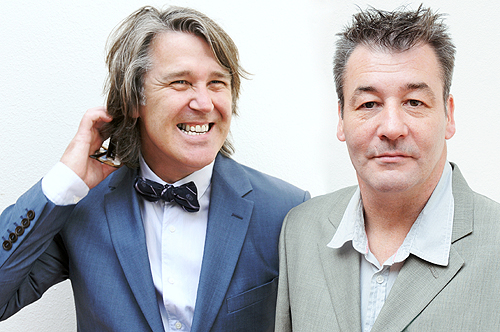 80s - China Crisis (2020)
80s - China Crisis (2020)
The Way We Are Made: The China Crisis Story
For those uninitiated, China Crisis (Gary Day and Eddie Lundon) are a band that formed in 1979 in Kirby, Liverpool and who achieved Singles and Albums chart success throughout the 1980s (and also had two albums certified Gold in the UK).
After signing a record deal with Virgin Records, China Crisis released their debut album Difficult Shapes & Passive Rhythms, Some People Think Itís Fun to Entertain in December 1982. The album shot up the UK Albums charts to #21 and was later certified Silver.
Their career thereafter would go on to grow exponentially, with their sophomore efforts Working with Fire and Steel Ė Possible Pop Songs, Volume Two going to #20 in the UK Charts and being certified Gold.
The beautiful Wishful Thinking was the biggest song from the album, managing to secure a place at #9 in the UK Singles charts.
However, it was Flaunt the Imperfection (released in 1985) that catapulted the band to new levels of success making it to #9 in the UK Albums charts.
The album featured singles such as Black Man Ray (which went to #14 in the UK Singles chart) and King in a Catholic Style (which went to #19).
China Crisis followed their previous success by working with producers Clive Langer and Alan Winstanley, on their album What Price Paradise which was later released in 1986.
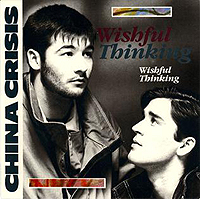
The album featured the song Arizona Sky which was the first single release from the band, but it was the song Best Kept Secret that went to #36 in the UK Singles Chart.
Their following album Diary of a Hollow Horse (released in 1989) was the fifth studio album by the band, but unfortunately it didnít match the commercial success of their previous records (although it still managed to achieve #58 in the UK Albums Chart).
The band made a comeback in the 2000ís with many European tours and still to this very day enjoy touring the world, reintroducing (and sometimes even introducing) different audiences to their music.
Furthermore, Autumn in the Neighbourhood (2015) was the seventh studio album by China Crisis (released on the bandís own Starbumb label), and was also their first studio album in 21 years!
Currently on a tour of North America, and not scheduled to stop this new world tour until 2021 (!), I caught up with both Gary Daly and Eddie Lundon backstage just before their small club gig at the Magic Bag here in Ferndale, Michigan - and I first wondered what it had been like for them back in 1978/79 playing in Knowsley post-punk groups before China Crisis was even born? Did you envision fame and being on TOTP even then?
Gary: No, we never really thought like that, ever. We were only in the moment, really. We didnít plan too far ahead, at all.
Eddie: We didnít even put ourselves on the cover of an album sleeve until Diary of a Hollow Horse.
So your image wasnít your selling point at all?
Gary: No, we were never sort of that sort of engaged with the visual side, really. I mean, I guess we were to a degree with our own single sleeves, but they were always inspired by Eno, Factory Records and the people we worked with.
Eddie: We definitely used to frustrate the record label, because they were getting people like Spandau Ballet and Wham! and they all thought about how they were looking.
Gary: Yeah, it was up there with their music. They had obviously studied pop to a degree and how they had wanted to be perceived. Whereas Eddie and myself just sorta smashed against the box. Because we would fall foul of people thinking we were this or that or the other just because we werenít really engaged in that way with of it really. We just found it all a bit frustrating.
So were the singles and albums artwork all your choices down the years?
Gary: Mostly ours. Yeah, they were great really.
Eddie: Well, they did some of it, donít get us wrong. Mainly they would do it for you if you were away on tour and you had a new single coming out and so they would just do the sleeve the way they wanted to.
Generally, and certainly for all our albums sleeves, we got to work with all the graphic designers. Peter Saville, for instance, he was the one working for Factory Records and doing all the Joy Division stuff, he did the first Difficult Shapes album. So yeah, you do get to sit down and work with them most times.
Having formed in 1979 and instantly becoming part of this wave of new Liverpool acts Ė such as OMD, Echo & The Bunnymen, Teardrop Explodes, A Flock of Seagulls, etc. - back then were you all running into each other, fighting over the local gigs?
Gary: We grew up outside of Liverpool. We were actually 89 miles outside of Liverpool so we didnít grow up with all those fellas and bands.
Eddie: Weíre from a little town called Kirby.
Gary: So we wouldnít have come across them until we were 17, 18 and 19, when we started to go into town and see the likes of OMD and A Certain Ratio. We actually went and saw the Bunnymen and the Teardrops on a double header and we came away sort of very unimpressed by a lot of them.
Why?
Gary: Well, because they were bands and they seemed happy enough just to make as much volume out of the guitar as they could. You could tell who they were influenced by and stuff, like Velvet underground and Bowie and these kind of people. A lot of them were even Bowie clones, where they would dress like him and such.
But Ed and myself are from big families. Edís one of ten and Iím one of eight so we had a lot of sisters and brothers which meant there would have been a lot of different music on growing up.
Everything from Motown to country and western. Johnny Cash to the Beatles, to Bowie to everything. So me and Ed were never so blinkered that it was an issue for us.
I donít think they appreciated us that much, all the other bands, because we come out of Kirby and they didnít know who the hell we were and why we sounded like we did, he laughs.
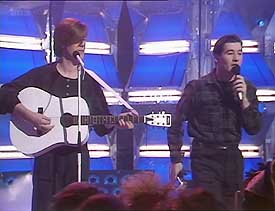
China Crisis - Christian (on TOTP 1983)
I was watching an old Top Of The Pops (TOTP) clip of China Crisis performing Christian in 1983 and you guys just looked so calm, so relaxed!
Gary: We had been on the telly I think twice before on local TV, so by the time we got to TOTP we knew that if the camera was pointing at you and the light was red it was on.
And we were calm, basically, because being on the telly didnít have a huge amount of interest to us. It was exciting because people would get to see us, and TOTP was iconic, but none of the bands we liked were ever on TOTP.
We liked Yes, ELP, a bit of Bowie and Magazine, and Talking Heads, but they came on in the late 70ís early 80ís when we would have just been catching up with TOTP. So we would have been like that because we were a little like deer in headlights.
Over the years there has been a lot of disinformation about how the band got its name, so please tell us now how the name China Crisis was born?
Gary: It was in the local pub next to Edís mumís house and we used to work so many nights a week until about ten at night in Edís house Ö
Eddie: ... and last orders was always ten thirty and youíd have to be out the pub by eleven.
Gary: It was a chance for us to go down the pub and meet our mates from school and see who was in there. One night we were all sat round the table and we ha da few tunes, we had been doing some stuff at the Church Hall, just to see what it would sound like live, and we just needed a name.
And it was all still Communist with China and Russia and it was all very exotic because we knew absolutely nothing about it although we had a China Town in Liverpool.
So people would have just been throwing Russia In Crisis about, Red Russia, Chinese something else, and then one of the guys put the two words together and everyone just went Thatís it!
But we immediately didnít sort of go like Wow! Thatís the name, Gary laughs.
Eddie: We just thought that all the names of bands we were discussing were just as bad as each other. But you always hate your name until you first see it in press or itís heard on the radio or on TV and then it takes a life of its own.
What was a close second?
Eddie: Russia In Winter, he laughs, not even joking!
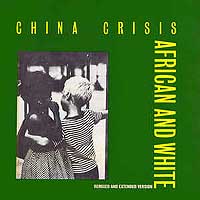
From 1981 to 1984 you had a string of Singles Chart hits, so reflecting back on the one that got your toe in the door, please tell us more about how African and White came to be?
Gary: The riots were in Brixton, London, Liverpool, Toxteth and Birmingham and basically, my girlfriend at the time, her sister lived in Toxteth so I was already familiar with the area. It was very ghetto, black, Jamaican and West Indian community and they rioted at the same time as Brixton and my girlfriends sister Mary, her boyfriend Andy he was involved in the riots.
So I saw it first hand and there was a little bit of a movement going on from those people who have got f**iní nothing and they see everybody else with it, well, you know, then they want some as well.
It wasnít like you could just go an get a job and get stuff, because there were no f**iní jobs. Then Deanís other two sisters were about to emigrate to South Africa and so in their mumís house there would have been a lot of literature about South Africa.
So we would have seen words like Afrikaan and Apartheid and I would have seen that and said to myself, Well, thatís whatís happening here really. We could go too far and it could f**kiní happen here Ö or is it already happening here and we just donít call it an Apartheid?
But as Iíve said to people on tour, we werenít the kind of songwriters that sat down and told stories, itís just stuff like that would be in our consciousness, because it was actually happening. And then we added a bit of music and opened our mouths and stuff came out!
And then Iíd be like, great, yeah, thatís a song and life is a fever in Israel in the chorus was because Israel was never off the telly.
Eddie: It was all the PLO and Yasser Arafat and all those conflicts were happening at the same time.
Gary: We hadnít long been out of school and weíd both left at 16 from the largest Roman Catholic school in Europe. So we werenít exposed to nothing really, other than the fact nobody wanted to be at the f**kiní school, he laughs.
I was entered for no exams and Eddie got a few GCSEís so if you can imagine we had left that situation and walked into the real world.
Eddie: We never stayed on at the school. We left and I went briefly into an apprenticeship to fix trucks and Gary went into hairdressing, but we only stuck it for a few months because we were still writing. In the meantime I never managed even a year at my apprenticeship because we got a record deal so I left the job.
Gary: So it was like we were passionate about music, we had been no good at anything else, so when we were teaching ourselves to do that it would have been like opening up to a well that had sorta been shut off from us before.
Suddenly it was like David Byrne was informing us more than any teacher ever had. And Eno. It was like we were at an Open University and Eno was our professor. And every record he was involved from John Hassell to Harold Budd, to the Talking Heads and Devo, to Bowie was like we were witnessing a musical masterclass.
The record would drop and we would be looking up the credits going, Oh, so they used tapes. Whatís using tapes mean? Oh, I see, heís recording voices off the radio or the television. We learnt everything from Eno and so soon it was just pouring out of us in a great way.
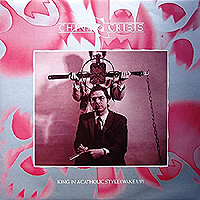
Which other of your hits singles would you yourselves now like to talk about?
Gary: King In A Catholic Style, Gary immediately jumps at. Basically, we would have been writing for Flaunt and have come home from being on tour with Simple Minds and Fire and Steel. So we would have been in L.A. and Warner Bros. wanted to know who was going to produce the third album, because they owned it.
Eddie: We were signed to Virgin Records worldwide, there wasnít a Virgin Records in the USA at that time so what we used to do was license ourselves here with different labels. The first label we were on in America was A&M and after that we were licensed to Warner Bros.
Gary: I am now gonna fill in those holes, Gary chips in. We actually were on Virgin, because they did have a label over here when we first arrived, then we had Warner Bros. and then we were on A&M! A&M had died, but it was after Warner Bros. though.
Eddie: Yeah, yeah.
Gary: Well, you said it was before Ö but this is why we havenít done the book yet, Gary laughs, because we havenít got our stories straight. Basically, we were on Virgin and then we were licensed to other labels.
Anyway, Warner Bros. asked us who was gonna produce the next album and Eddie jokingly said Gary Katz who produced Steely Dan. They then told us they had Walter Becker on their books and would we like them to get in touch with him?
So they got in touch with him and Walter, who was living in Hawaii, already had Working with Fire and Steel the album, which was mind blowing to us! Eddie and myself were only five years out of school and we loved Steely Dan as kids at school.
Aja, The Royal Scam and Canít Buy a Thrill we were familiar with all that, so it was a bit mind blowing to learn that he had a copy of Fire and Steel!
He then agreed to come over to London to meet us and hear the demos. So when he would have heard the demos and King In A Catholic Style would have been an instrumental. It would have been a bass line [here Gary starts to vocally mimic it] and a drum machine [same again], and Eddieís guitar [again].
We wouldnít have had any shuffle beat, any [he now whistles] and so when we met Walter we were just signing the idea to him as we pressed play on the cassette!
But by the time he was going home after a couple of weeks he would have had a version with some vocals on. He would have gone back to Hawaii and worked on it and me and Eddie went back to Liverpool and carried on working on the rest of the demos.
I remember that we were really whooped up for the session in the studio. Walter would have worked with Kevin and Gaz for a couple of weeks on drum and bass on the rhythm section, Eddie and myself would have carried on with the melodies and lyrics for the songs, and when we finally all got together in the studio.
You do one track at a time, then the backing tracks, and then you might put a guide vocal on. But at one point I can remember distinctly being in the control room and we were just about to record the drums for King.
At some point it would have gone from a straight beat to a shuffle. Someone would have added a shuffle. So between Kevin and Walter and us sitting in the room, the shuffle came to be and then that drove it along a bit more.
And at some point Walter would have been on the keyboard, because we would have had it set up with our keyboards that we had to what weíd done on the demos.
Because Walter wasnít an idiot he would have kept our simple, simplistic little lines on each song and added a little pad. But the pad on the songs wouldnít have been two hands ten fingers, because me and Ed couldnít play like that because we were still learning.
It would have been like three fingers, or even two or a bass line that was shaped by the drum machine and the sequencer by just holding down a note [he then shows me what he means with his hands, whilst humming the melody to Black Man Ray].
And Walter f**kiní knew this because this was a million miles away from what he was used to working with, because he was now part of New Wave, he was in Europe, and we were kids from out of England!
His mum was actually English so he would have been, F**kiní hell, Iím in with the New Wave kids! So, he at some point went to the keyboard and went [Gary vocalizes notes again], which is just a hoopla really.
So thatís how generous he was and heís definitely the closest that Ed and myself ever got to working with a music genius.
I mean, weíve worked with great people and weíve met Bowie, supported him and Carlos Santana, the Eurythmics, the Police, so weíve met all the stupid great people from our time and they were amazing, but to actually work with Walter Ö his capacity for music and arranging and stuff it never fatigued him. Never tired him.
And weíd watch him with the brass people and heíd be directing them, telling them what would sound better and heíd just be copying a little synth line we did, but he would have elaborated on it.
It was just amazing Ö and I havenít got that much music in me head, Gary laughs. I always think of Ed and myself as intuitive. Because like intuitive people thereís cerebral people and then thereís great musicians and thereís some that encapsulate all of it. Like Jimi Hendrix, John Lennon and Paul McCartney.
So nobodyís taught us anything, so everything that has happened has happened because weíve had a willful disposition that has made us sit there and go, Somethingís gonna happen and Iím not gonna let the fact that I canít do this intimidate me or stop me.

I, like a whole host of ex-patís over here in the US, have never seen you perform live and as it has been, for me at least, 37 years since I first wanted to. So what would you say are the main differences between having seen China Crisis live back in 1983 and here now in 2020?
Gary: Oh, I love it more now.
Eddie: But theyíre also two completely different experiences. When weíre here in the United States or anywhere else where itís obviously expensive to travel and get visas and hotels and everything so we only come over as a four-piece.
We also have a full seven-piece band back home and for Europe and so the shows are very, very different. So we donít do a lot of the electronic stuff that we do over there over here, because the band donít do those bits.
Has China Crisis ever broken up over the years?Gary: Weíve certainly not been together for one or two times Ö
Eddie: ... yeah, but thatís just the times when weíve left things alone for a while.
So, in those pockets of time away from each other and from music in general, what do you both turn to?
Eddie: Yours would be that you paint a lot, Eddie says, nodding toward Gary.
Gary: I draw a lot, but I donít paint. Iíve drawn for the last 31 years.
Eddie: Football, for pleasure, yeah, absolutely. But I teach a lot as well at the Paul McCartney School [The Liverpool Institute for Performing Arts (LIPA)], but thatís not in quiet moments, thatís actually full on!
The last China Crisis album was Autumn In The Neighborhood in 2015 so Iím wondering, as that took 21 years to bring out since the one prior, will there be a new album out anytime soon?
Gary: It was five years ago since Autumn and it doesnít feel that long ago. It feels more like 18 months.
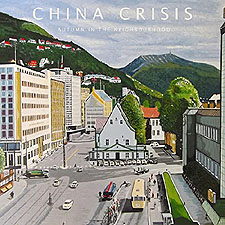
Eddie: To make a new record you do it for the pleasure of it these days, because itís not the industry that it was where the record labels made a fortune off you.
Gary: Youíd be shocked at how many pre-ordered Autumn. It took us nearly three years to get advance orders of just 800. That was just the advance orders though and it has gone on to be repressed three times now.
Weíre also gonna do a vinyl edition of it this year which will have new artwork and a couple of different tracks that we didnít put on the original version.
What youíve got to understand though is that would be a lot different today, because when we did that five years ago we had no internet presence. Now weíre connected to so many people and all our tours sell out now.
It would be very different now because our internet presence now has gone from like zero to hero, kinda thing.
We never had a website or anything like that, but thereís a China Crisis Appreciation Society set up by a fan on Facebook, but we also have our own official China Crisis Facebook page.
So, no plans even for what could come next music wise for China Crisis?
Gary: Well, I think the next thing will be the Classic Crisis tour.
Eddie: You see, weíre basically touring now until April of next year, so that is when it will turn into Classic Crisis.
And what, pray tell, is this Classic Crisis all about?
Eddie: Next year we will be doing Classic Crisis where weíll be playing just the classics with some new songs. And weíll definitely record it also.
Gary: So that will have all the strings and an orchestra-type thing. A lot of artists have done it and it would be nice to have a record to promote on that tour, because I think our music more than a lot of artists that have done it would really suit it.
I can really hear Christian and Here Comes a Raincloud and The Soul Awakening and Wishful Thinking played like that.
I mean, can you imagine if Wishful Thinking was orchestrated with actual strings how great that would sound.
In closing, and as we ask everyone this question due to compiling answers for an upcoming childrenís charity book, do you like Penguins?!
Gary: Donít they call that a penguin suit when youíve got a dickie bow on and a black suit? Yeah, so Iím in one in the Black Man Ray video at the piano, so thatís the closest Iíve ever got to being one, he laughs.
Eddie: Iím actually related to a Puffin, Eddie says, straight-faced. Me name Lund, as in Lunden is puffin in Inuit, he beams proudly.
Gary: We suspect Eddie is Inuit or something from his dadís side.
And so, if you were allowed to have a Penguin as a pet, what would you name him or her?
Gary Arnie, he instantly replies, laughing loudly.
Eddie Canute, he replies, after a moment of thought. Like King Canute, because heís Norwegian and Icelandic and thatís where they live, donít they, he laughs, one last time.
Interviewed by Russell A. Trunk
China Crisis @ Facebook
China Crisis Appreciation Society
Buy Gary Daly (Solo) CDs @ Music Glue
Back To Archives

